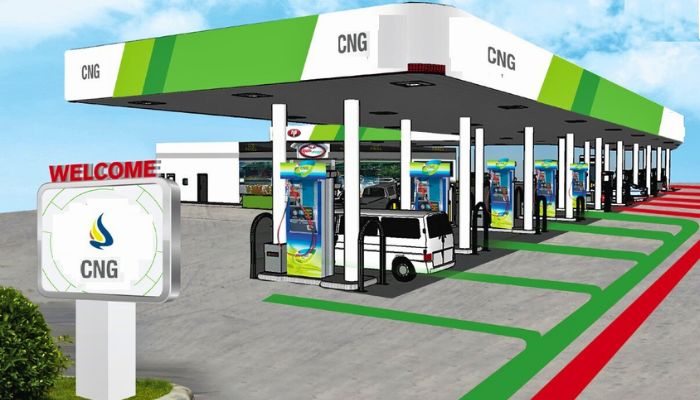Converting your car from gasoline to CNG is a very critical decision and, therefore, must be done after carefully considering the perks and downsides of the transition. If you have been considering whether a CNG engine is right for you, you need to check out the benefits and disadvantages to aid your decision-making.

This article will delve into all you need to know about CNG, including its fueling mechanism, advantages, and disadvantages and also answer any other questions you may have about such engines.
What is CNG?
CNG, an acronym for Compressed Natural Gas, is a natural gas that has been compressed to a high pressure for storage and transportation. It is a cleaner-burning fuel compared to gasoline or diesel, making it one of the most viable and environmentally friendly alternatives for vehicles.
Compressed Natural Gas is produced by storing natural gas at baseline temperature and high pressure. It is clean, odorless and non-corrosive. Aside from being a suitable alternative for motor vehicles, CNG can also be used for power generation, water heating and air conditioning.
However, for the purpose of this article, we will focus on Compressed Natural Gas as fuel for motor vehicles.
Benefits of converting my car to CNG
By converting your car to CNG, it will begin to run on Compressed Natural Gas. As an alternative to gasoline, CNG offers several benefits when used in your car. These benefits include:
-
Reduced emissions
Using Compressed Natural Gas in your vehicle significantly reduces levels of pollutants including carbon monoxide, nitrogen oxides and other hydrocarbons. This makes it more environmentally friendly when compared to traditional fossil fuels such as gasoline.
-
Limited flammability
Compared to gasoline, CNG is known to have limited flammability, thereby significantly reducing the potential of accidental combustion. This makes it a safer alternative.
-
Lower operation and maintenance costs
One great advantage of CNG over traditional fuels like gasoline and diesel is the lowered cost of operation and maintenance. When compared on a mile-to-mile basis, CNG is drastically cheaper than petrol.
This is made possible due to the absence of any lead or benzene content in CNG, thereby eliminating the lead fouling of spark plugs. Also, CNG fuel systems are sealed, preventing any spill or evaporation losses.
Also, Compressed Natural Gas (CNG) does not dilute or contaminate your motor oils like traditional fuels do all the time. Being a gaseous fuel, CNG mixes easily and evenly in air.
-
Flexibility and ease of use
Even after converting your car to CNG, the basic engine characteristics of the vehicle are retained. This means that your vehicle is capable of running either on petrol or CNG at the flick of a switch on your dashboard.
Other benefits of converting your car to CNG include:
- Improved fuel efficiency
- Reduced noise
However, there are some challenges you might want to put into consideration such as the limited availability of CNG fueling stations in some areas and the high cost of converting your vehicle to CNG. You can check out the CNG conversion and fueling centers around Nigeria to get started.
Fueling Process of a CNG Engine
A petrol vehicle is not so different from a CNG vehicle, except for the difference in the fuel system. Natural gas is compressed between 3,000 and 3,600 pounds per square inch (200 bar) and is stored on board the vehicle in cylinders installed in the rear, undercarriage, or on the roof.
When the engine requires natural gas, it exits the cylinders, makes its way through a master manual shut-off valve and travels through a high-pressure fuel regulator located in the engine compartment.
The CNG is then injected at atmospheric pressure through a uniquely designed natural gas mixer where it properly mixes with air. Then, it flows into the engine’s combustion chamber and is ignited to create the power required to drive the car.
Special solenoid-operated valves are present in the system to prevent the gas from entering the engine when it is shut off.
FAQs on Benefits of converting my car to CNG
Is CNG safe for my vehicle?
CNG is considered safe for your vehicle, no matter the brand or model. It is a safe and proven fuel for vehicles designed for your safety. CNG vehicles feature robust tanks and a wide range of components that undergo rigorous testing, giving you peace of mind.
In addition, CNG is lighter than air, meaning it dissipates quickly in cases of a leak.
What if there’s a fire?
CNG cylinders are designed to withstand high pressure and are equipped with safety features like solenoid-operated (pressure relief) valves that release gas into the engine in a controlled manner, thereby preventing explosions.
When there is a leak, CNG quickly dissipates into the air rather than pooling on the ground like gasoline, reducing the risk of a fire outbreak.
Will CNG affect my car’s performance?
Some petrol vehicles converted to CNG are subject to a little power loss (about 10%) when running on natural gas. However, some other vehicles and those designed specifically to run on natural gas may even have greater power and fuel efficiency.
Many drivers report smoother acceleration and quieter operation with CNG than with gasoline. CNG has a 120 to 130 octane rating, compared with the 87 to 96 octane rating of petrol.
Leave a Reply